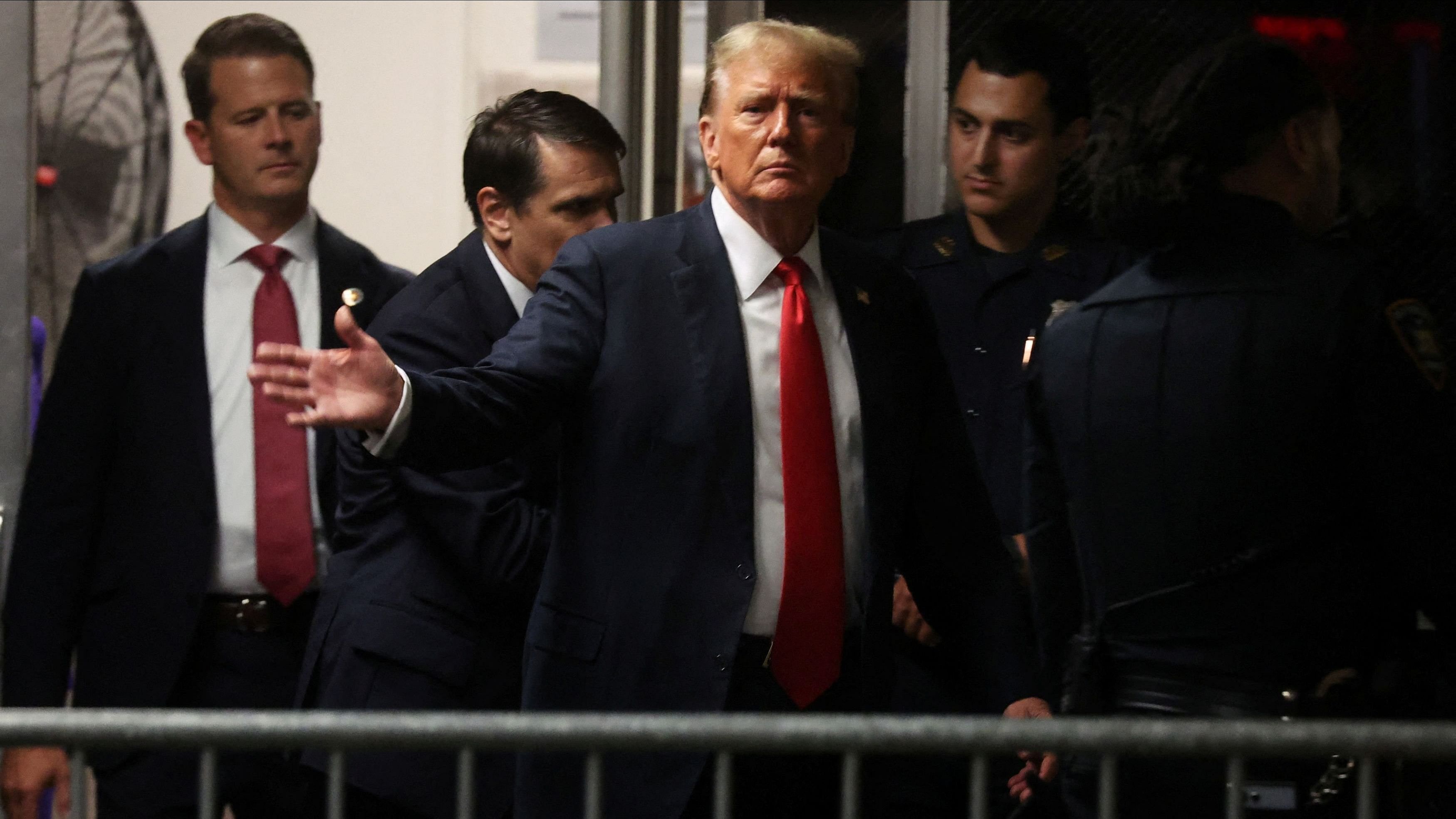
Former US President Donald Trump returns after a break in his criminal trial for allegedly covering up hush money payments at Manhattan Criminal Court on May 28, 2024 in New York City, USA.
Credit: Reuters Photo
A panel of 12 New York jurors will for a second day on Thursday weigh evidence in the criminal trial of Donald Trump, the former president accused of falsifying documents to hide a hush money payment to porn star Stormy Daniels before the 2016 election.
Here are five milestone moments from the historic first trial of a former US president:
Stormy's story
Daniels, whose given name is Stephanie Clifford, described her alleged 2006 sexual encounter with Trump in unflattering detail, telling jurors that she blacked out briefly before waking up on the bed with most of her clothes off.
She said she was not coerced into having sex with him but did not find the experience enjoyable.
"I was trying to think about anything other than what was happening there", Daniels testified.
Trump's lawyers moved for a mistrial, saying her testimony would only inflame the jury and was irrelevant to a case about business records. Justice Juan Merchan, overseeing the case, agreed that some of her testimony "probably would have been better left unsaid" but denied their request.
Daniels' detailed account could undermine the argument of Trump's lawyers, who say the two never had sex.
'Just do it'
Michael Cohen, Trump's estranged former fixer, told jurors on May 13 that Trump personally approved the $130,000 hush money payment to Daniels. "He expressed to me: 'Just do it'", Cohen said.
He said Trump was worried about alienating female voters if the story got out, not any fallout he might experience at home.
"He wasn't thinking about Melania. This was all about the campaign", Cohen said, referring to Melania Trump, his wife.
Cohen said Trump approved a plan to reimburse him for the Daniels payment at a meeting at Trump Tower after the election.
His testimony formed the central pillar of prosecutors' case. They have argued that the altered records amount to a felony crime because they covered up evidence of a payment that corrupted the 2016 election.
Trump's lawyers have suggested the payment for Daniels' silence could have been made to protect Trump's family from embarrassment rather than to boost his political prospects. Prosecutors say the payment was effectively an illegal campaign contribution.
Cohen's lying and stealing
During cross-examination, Trump's lawyers highlighted Cohen's criminal record and history of lying to paint him as a turncoat who hates Trump and is eager to see him imprisoned.
Cohen admitted that he lied to journalists and Congress and lied under oath while pleading guilty to federal tax evasion charges. Cohen said he pleaded guilty in that case to prevent his wife from being charged, even though he agreed at the time he had not been coerced.
Cohen also admitted that he stole money from Trump's company by pocketing cash meant for a vendor, because he thought his annual bonus should have been bigger.
Those admissions could undermine the credibility of Cohen, the prosecution's most important witness.
Trump's signed checks
On May 7, prosecutors displayed Trump's tall, looping signature in thick ink on nine separate $35,000 checks to Cohen. Prosecutors say those payments were reimbursements for the Daniels payoff, but were disguised as legal fees to avoid making a record of the allegedly illegal campaign contribution.
Cohen testified that those payments were meant to reimburse him for the Daniels payoff, rather than legal work. Prosecutors did not call any witnesses other than Cohen who could testify that Trump deliberately sought to obscure those payments as legal fees. The one person who might have been in a position to do so, former Trump Organization CFO Allen Weisselberg, is serving a five-month jail sentence for lying under oath.
Merchan warns Trump that he risks jail
On May 6, Merchan warned Trump that he would put Trump in jail if he continued to violate a gag order that bars the former president from criticizing witnesses and jurors, as well as relatives of both the prosecutors and the judge.
Trump had spent the previous weeks testing the limits of that gag order in media interviews, campaign rallies and impromptu press conferences outside the courtroom.
Merchan ruled that Trump had violated the terms of the gag order 10 times and fined him the maximum allowed by state law: $1,000 per violation.
That, Merchan noted, did not serve as much of a deterrent to someone as wealthy as Trump and he warned that tougher sanctions might be needed. "I do not want to impose a jail sanction and have done everything I can to avoid doing so. But I will if necessary", he said.
If he had followed through, that would have been the first time a former US president spent time behind bars.
The dramatic moment will not affect the outcome of the trial, as jurors were not in the room to witness it.